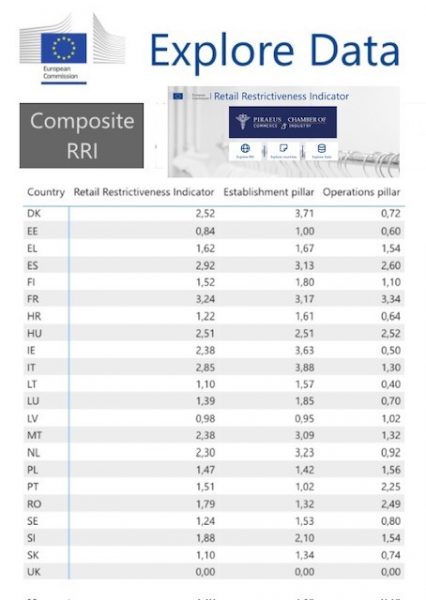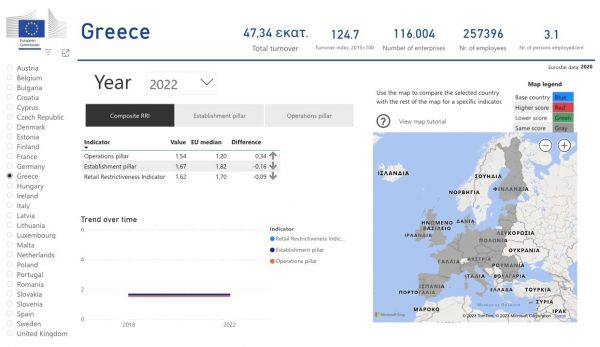
One of the most restricted sectors in the EU is retail trade, according to what the Piraeus Chamber of Commerce and Industry-EVEP reports in its announcement.
The EVEP informs that the RRI (Retail Restrictiveness Indicator) of the European Commission, which refers to the restrictions of retail trade, confirms that it is one of the most regulated business sectors in the EU.
The European organization EuroCommerce, which represents retail and wholesale trade in Europe, emphasizes that the retail environment has remained the same, or even worsened, since 2018, when the index was established.

Retail provides an essential service but faces a challenging environment with high inflation, while at the same time it needs to be able to support the EU’s digital, sustainability and skills goals.
The RRI provides a useful tool to indicate the constraints hindering the digital transformation, sustainability and long-term competitiveness of the commercial sector. The index mainly concerns restrictions for retail outlets, such as permits required to open stores and local operating restrictions specific to retail trade. There are obviously more rules that apply to retail, but these apply to other sectors as well.

Possibilities to reduce the regulatory burden
This means that there is huge potential to reduce the regulatory burden and increase competition and innovation in the commercial sector. There are 3.5 million retail businesses in Europe, i.e. 1 in 6 total businesses, providing 16.5 million jobs, especially for young people. EuroCommerce has chosen a different direction in recent years, preventing member states from imposing more legal requirements, political pressure and increased inspections across the EU. This way supermarkets will be able to reduce food prices, or keep them low. Reducing the burden of regulatory costs may be the answer according to a recent study published by EuroCommerce in collaboration with McKinsey, which shows that margins in food retailing have been reduced.
EuroCommerce therefore encourages the Commission, Member States and the European Parliament to use the RRI to assess how regulatory burdens in the sector can be reduced. This will boost competitiveness and innovation and offer more choice and affordability to consumers. This will also be a step forward in achieving the goals of increasing integration and reducing regulatory compliance set by the EU in its recent post-2030 communication.
The president of the E.V.E.P. and member of EuroCommerce, Vassilis Korkidis, stated that he agrees to discuss, within the framework of a Task Force, the enforcement of the single market (SMET), in order to contribute to the removal of barriers, as well as administrative costs in the commercial sector. It also welcomes the RRI’s reference in the European Semester Spring Country Reports and believes that the EU should consider expanding them in the future with country-specific recommendations asking Member States to remove unnecessary and unjustified barriers to retailers and wholesalers. In Greece, the index shows a significant improvement between 2018 and 2022, since it now fluctuates at better levels than the European average. The trade sector can therefore look to the RRI as a tool, which, during the transition period, will act as a road map for the retail and wholesale ecosystem in every EU market and certainly in the Greek one.
Latest News

German Ambassador to Greece Talks Ukraine, Rise of Far Right & Tariffs at Delphi Economic Forum X
Commenting on the political developments in his country, the German Ambassador stressed that it was clear the rapid formation of a new government was imperative, as the expectations across Europe showed.

Athens to Return Confiscated License Plates Ahead of Easter Holiday
Cases involving court orders will also be excluded from this measure.

Servicers: How More Properties Could Enter the Greek Market
Buying or renting a home is out of reach for many in Greece. Servicers propose faster processes and incentives to boost property supply and ease the housing crisis.

Greek Easter 2025: Price Hikes on Lamb, Eggs & Sweets
According to the Greek Consumers’ Institute, hosting an Easter dinner for eight now costs approximately €361.95 — an increase of €11 compared to 2024.

FM Gerapetritis Calls for Unified EU Response to Global Crises at EU Council
"Europe is navigating through unprecedented crises — wars, humanitarian disasters, climate emergencies," he stated.

Holy Week Store Hours in Greece
Retail stores across Greece are now operating on extended holiday hours for Holy Week, following their Sunday opening on April 13. The move aims to accommodate consumers ahead of Easter, but merchants remain cautious amid sluggish market activity.

Green Getaway Ideas for Easter 2025 in Greece
Celebrate Easter 2025 in Greece the sustainable way with eco-farms, car-free islands, and family-friendly getaways rooted in nature and tradition.

Civil Protection Minister Details Summer Firefighting Plans at Delphi Forum
At the 10th Delphi Economic Forum, Minister of Climate Crisis and Civil Protection Yiannis Kefalogiannis discussed Greece's plans for the upcoming fire season.

How Shops and Markets Will Operate During Easter Holy Week
The Easter holiday schedule has been in effect since April 10, with retail stores open Palm Sunday, and most supermarkets also operating to meet consumer demand for Easter shopping

Why Is the French Aircraft Carrier Charles De Gaulle in Piraeus?
Docking in Piraeus after a four-month deployment in the Indo-Pacific region, the admiral of the aircraft carrier the Charles de Gaulle says, "Greece is our best partner in the Mediterranean."









































 Αριθμός Πιστοποίησης
Αριθμός Πιστοποίησης